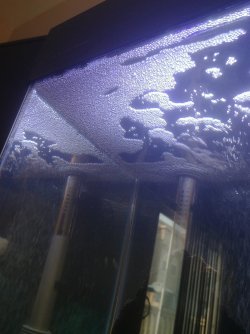Koglin
Fish Crazy
Still new, and I've recently redone my aquarium to make a more natural environment for my fishys.
The next up on the chopping block for consideration: my 6" bubble wall. Originally I had gotten it for the aesthetic, but after redoing the tank yesterday it crossed my mind that I could be disturbing the surface "too" much between the bubbles and the HOB filter (it's only a 10 gal. tall, the surface area is roughly 12.5"x12.5" so it doesn't take a whole lot to get the top moving), however I seem to have a constant collection of bubbles on the top of my tank, usually covers roughly 25% of the surface as they float around (attached a pic of my "bubble field").
After reading signs/symptoms of over oxygenation and under oxygenation(or w/e the word is) I'm pretty sure it's fine at the moment, and I have no telltale signs, and while my pygmy Cory's like to play in the mid lvl sometimes, I don't catch them going to the surface for air.
I'm all about preventative measures though, hate avoidable repercussions in hindsight.
I keep my HOB turned down to a about a third of it's strength, roughly 26-28 gph, and simply assumed the bubbles would help the slower HOB flow rate with surface disturbance.
I would love to leave the bubble wall in there, but am fine with going down to a small/regular size airstone if needed. I normally unplug the air filter at night too.
If it sounds like I'm overdoing it to an experienced hobbyist, please let me know!
Any advice or input is appreciated, thanks!
The next up on the chopping block for consideration: my 6" bubble wall. Originally I had gotten it for the aesthetic, but after redoing the tank yesterday it crossed my mind that I could be disturbing the surface "too" much between the bubbles and the HOB filter (it's only a 10 gal. tall, the surface area is roughly 12.5"x12.5" so it doesn't take a whole lot to get the top moving), however I seem to have a constant collection of bubbles on the top of my tank, usually covers roughly 25% of the surface as they float around (attached a pic of my "bubble field").
After reading signs/symptoms of over oxygenation and under oxygenation(or w/e the word is) I'm pretty sure it's fine at the moment, and I have no telltale signs, and while my pygmy Cory's like to play in the mid lvl sometimes, I don't catch them going to the surface for air.
I'm all about preventative measures though, hate avoidable repercussions in hindsight.
I keep my HOB turned down to a about a third of it's strength, roughly 26-28 gph, and simply assumed the bubbles would help the slower HOB flow rate with surface disturbance.
I would love to leave the bubble wall in there, but am fine with going down to a small/regular size airstone if needed. I normally unplug the air filter at night too.
If it sounds like I'm overdoing it to an experienced hobbyist, please let me know!
Any advice or input is appreciated, thanks!

